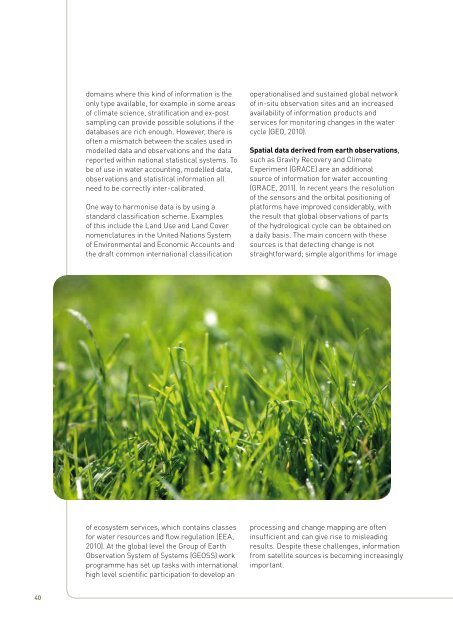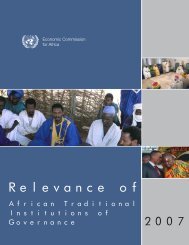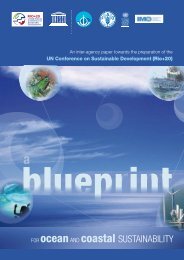MEASURING WATER USE IN A GREEN ECONOMY - UNEP
MEASURING WATER USE IN A GREEN ECONOMY - UNEP
MEASURING WATER USE IN A GREEN ECONOMY - UNEP
You also want an ePaper? Increase the reach of your titles
YUMPU automatically turns print PDFs into web optimized ePapers that Google loves.
domains where this kind of information is the<br />
only type available, for example in some areas<br />
of climate science, stratification and ex-post<br />
sampling can provide possible solutions if the<br />
databases are rich enough. However, there is<br />
often a mismatch between the scales used in<br />
modelled data and observations and the data<br />
reported within national statistical systems. To<br />
be of use in water accounting, modelled data,<br />
observations and statistical information all<br />
need to be correctly inter-calibrated.<br />
One way to harmonise data is by using a<br />
standard classification scheme. Examples<br />
of this include the Land Use and Land Cover<br />
nomenclatures in the United Nations System<br />
of Environmental and Economic Accounts and<br />
the draft common international classification<br />
operationalised and sustained global network<br />
of in-situ observation sites and an increased<br />
availability of information products and<br />
services for monitoring changes in the water<br />
cycle (GEO, 2010).<br />
Spatial data derived from earth observations,<br />
such as Gravity Recovery and Climate<br />
Experiment (GRACE) are an additional<br />
source of information for water accounting<br />
(GRACE, 2011). In recent years the resolution<br />
of the sensors and the orbital positioning of<br />
platforms have improved considerably, with<br />
the result that global observations of parts<br />
of the hydrological cycle can be obtained on<br />
a daily basis. The main concern with these<br />
sources is that detecting change is not<br />
straightforward; simple algorithms for image<br />
of ecosystem services, which contains classes<br />
for water resources and flow regulation (EEA,<br />
2010). At the global level the Group of Earth<br />
Observation System of Systems (GEOSS) work<br />
programme has set up tasks with international<br />
high level scientific participation to develop an<br />
processing and change mapping are often<br />
insufficient and can give rise to misleading<br />
results. Despite these challenges, information<br />
from satellite sources is becoming increasingly<br />
important.<br />
40

















